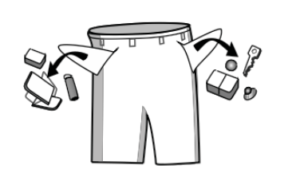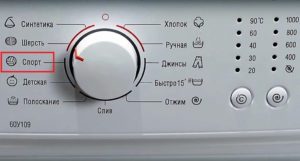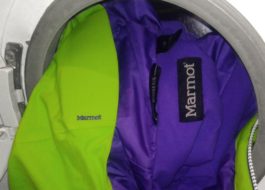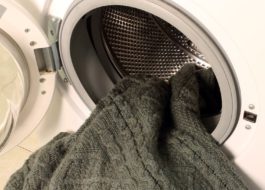How to wash polyester in an automatic washing machine
 In the modern world of synthetic fabrics, polyester clothing is an indispensable attribute of any wardrobe. However, like any other fabric, polyester eventually begins to need washing. And here the question arises, is it possible to wash 100% polyester in a washing machine or is it better to limit yourself to hand washing?
In the modern world of synthetic fabrics, polyester clothing is an indispensable attribute of any wardrobe. However, like any other fabric, polyester eventually begins to need washing. And here the question arises, is it possible to wash 100% polyester in a washing machine or is it better to limit yourself to hand washing?
Getting ready to wash
In fact, now almost any item can be washed automatically. However, each fabric has its own care features, which need to be carefully studied before loading laundry into the drum and confidently pressing the buttons on the panel of your SM.
In general, when purchasing a piece of clothing, it is usually accompanied by a sewn-on fabric tag, which indicates the basic parameters for caring for the product, including washing conditions. The only restriction for washing items in the washing machine is the icon in the form of a crossed out container of water. If there is none, automatic washing for this item is acceptable.
- Before washing clothes in the washing machine, it is better to patch all the holes and tears in the clothes, fasten all the zippers and remove foreign objects from the pockets, if any.
- It is better to spot treat serious stains with soap before placing them in the drum.
Actually, that’s all about preparing for washing. Now you can proceed directly to the process. An important detail is the detergent, which must be chosen not at random, but with special care. Here are some recommendations.
- If the laundry is white or light in color, gel capsules are preferable.
- For colored or black fabrics, products are sold with the appropriate marks “For colored fabrics” or “For washing black”.
Why is it better to avoid bulk powders? Synthetics tend to be very difficult to rinse. And even washing the powder out of ordinary natural fabric can be extremely difficult. With prolonged practice of washing with loose powder, a considerable amount of it will accumulate in the polyester fibers, which will injure and irritate the skin.
Washing fabric in a machine
It should be said right away about the number of revolutions. Intensive washing is not for polyester, so limit yourself to 800 revolutions, or even all 600 if the fabric is very thin.
As for modes, the delicate or “Hand Wash” mode is what is needed for polyester and what is available in absolutely any model of washing machine. Perhaps you are lucky and your unit is equipped with a “Sports” wash function, specifically designed for sports washing. sets, which are usually made from the purest polyester. However, this mode is suitable for a dress, a coat, and even a blanket if they are made of polyethylene fabric.
For minor stains, you can generally limit yourself to the quick wash mode or a program with additional soaking, if available. Thus, your item will be subjected to high-quality soft care and washed well.
As mentioned above, the product depends on the color of the fabric, so do not forget that you need to wash white, black and multi-colored items strictly separately. Sort your items and wash them in several batches, having previously purchased detergents for black, white and colored laundry.
Attention! The temperature for washing polyethylene fabrics should be low - a maximum of 40 degrees.Firstly, synthetics are terribly deformed at high temperatures, and light polyester items acquire a sickly yellow tint, which significantly worsens the appearance of the product.
 The use of air conditioners is not only acceptable, but highly desirable, since modern hard water significantly worsens the quality of things. To avoid such consequences, conditioner will help; it will make the item softer and give it a pleasant aroma.
The use of air conditioners is not only acceptable, but highly desirable, since modern hard water significantly worsens the quality of things. To avoid such consequences, conditioner will help; it will make the item softer and give it a pleasant aroma.
What to do if things have catastrophic or persistent stains that are unlikely to be washed off using the above approach? No problem. There are several ways to get rid of stains before washing.
- Use a stain remover, but only if you are sure that your item will not be damaged by it.
- The popular method says that you need to wet the item and generously season the stain with table salt, which will absorb the dirt. Next, the item must be washed by hand with regular soap.
- There is also a 10% borax solution, which is applied to the stain with a cotton pad, and then the excess is removed with lemon juice. After this treatment, the item should only be washed by hand.
Now about ironing and drying. After washing, hang the product on the balcony or in a well-ventilated area. Synthetic fabrics rarely need ironing, as they do not wrinkle much. However, if you want to be 100% confident in your appearance, you can iron polyester only in the “Silk” mode on an iron through damp gauze.
What is polyester “afraid of”?
Don’t want to ruin your plastic item completely and irrevocably? Then here is a list of the strictest prohibitions for her care:
- no boiling!
- no bleach!
- no high temperatures!
- no to the sun's rays!
Moreover, the above rules apply not only to clothes made of 100% polyester, but to mixed materials, because there are many things where polyester is used together with other fabrics. Drying clothes automatically is also prohibited.. Only natural way of drying! To make synthetics dry faster, lightly wring them out by hand and hang them to drain in the bathroom or dry on the balcony. With the second option, most likely, you won’t even have to iron it, since polyester does not wrinkle when dried naturally.
Why can't you bleach? Although polyester is a purely synthetic fabric, it does not tolerate chemicals, unlike, for example, nylon or other synthetic fabrics. Therefore, make sure that your item is actually made of polyethylene.
In general, polyester fibers are made from polyesters, which are very susceptible to various types of erosion. They are destroyed by the slightest exposure to high temperatures, which is why any boiling, washing in hot water, drying in the hot sun or, especially, a heater or radiator is excluded. Of course, the item will not burn or evaporate, but its structure will be seriously damaged, which will lead to a completely indecent appearance and will prevent it from being worn anywhere outside the home.
Interesting:
Reader comments
- Share your opinion - leave a comment





















Add a comment